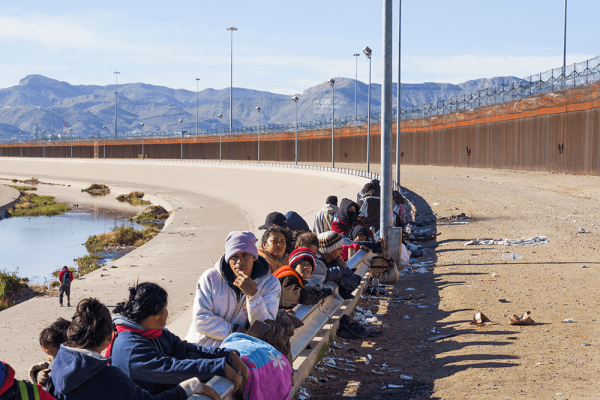During his recent visit to the U.S.-Mexico border, President Joe Biden announced changes to border enforcement and the asylum process — the legal process that allows people fleeing danger to seek safety in the U.S. One of the most concerning changes was an expansion of Title 42, a public health policy invoked by former President Donald Trump that weaponized the pandemic to turn away many Black and brown migrants looking for asylum.
It isn’t supposed to be this way: When people arrive at the border asking for help from violence or persecution, both international and U.S. law grant them a right to seek protection by requesting asylum. However, under Title 42, many people — including children and families — are sent directly back into the dangerous environments they were fleeing before they can even request asylum.
This announcement from the Biden administration should prompt us all to take a hard look at the laws that make up U.S. immigration policy. Ask yourself: Who do these laws protect and who do we see as worthy of receiving protection? Who benefits from the laws we create? Who do those laws apply to? Jesus tells us in John 10 that he came that we may “have life, and have it abundantly,” yet when I look at the U.S. immigration system, I see racist and xenophobic laws that claim the only people found “worthy” of protection and opportunity are those who have enough resources or are from the right places. This completely contradicts what God has told us about every person having equal value as part of the body of Christ. “Just as a body is one and has many members, and all the members of the body, though many, are one body, so it is with Christ,” writes Paul in 1 Corinthians 12:12, insisting a few verses later that “If one member suffers, all suffer with it; if one member is honored, all rejoice together with it” (v. 25-26).
During his border visit, Biden also announced that while they are expanding Title 42, they are also beginning a new program to allow up to 30,000 people from Venezuela, Nicaragua, Cuba, and Haiti to temporarily enter the U.S. to seek asylum if they apply from inside their home countries and meet all of the requirements. While this might sound like good news, for many people seeking asylum, those requirements are difficult if not impossible to meet. The Cair Coalition, an immigrant advocacy organization, estimated in an Instagram post that a person or family would need to:
- Know someone in the U.S. who has enough money to support them for up to two years, including housing, transportation, food, and medical needs.
- Access a smartphone or internet to contact that person and to apply for the program
- Have enough time and safety to complete all the paperwork and make all the appointments while fleeing for their life
- Access to all their life’s paperwork and a computer with internet to upload all of that necessary paperwork
- Money and time to buy a plane ticket to the U.S. in case you are given an interview to receive the temporary visa
It is hard to believe that a person fleeing for their lives would be able to meet these requirements; people fleeing for their lives rarely get to pick and choose how they travel to safety. That is why, under international and U.S. law, a person seeking asylum just has to reach the U.S. border and ask for help seeking protection from violence and persecution. Instead, this new program serves as a wealth and connections test, essentially only allowing people with access to wealthy connections in the U.S. to seek protection.
From the beginning, the U.S. immigration system has been a system of laws that protects and benefits white Europeans and wealthy people. These new policies make clear what our immigration system has emphasized over and over: Black and brown people from poorer countries are not worth protecting. The land of opportunity and freedom is not available as a hope for Black and brown migrants seeking safety, protection, and a future for their family.
Right now, the Biden administration is trying to present this announcement as an effort to make a safer way for people to come to the U.S. to seek protection. In reality, they are putting forth a harmful policy that will return many people back to the dangerous situations they are fleeing. While they are cracking a window open for a few asylum seekers with access to a lot of resources and privileges, they are shutting the door on most people seeking asylum.
This situation isn’t unfixable; we could choose to implement different policies. The U.S. has the capacity and resources to offer protection to people seeking asylum in a just and equitable manner.
When the war in Ukraine began, the U.S. promised to welcome 100,000 Ukrainian refugees and according to the nonpartisan Migration Policy Institute, it kept that promise by “extending protection to as many as 180,000” Ukrainians — a good and much needed response that modeled how should respond to people fleeing violence and danger. It showed that the U.S. has the capacity to welcome many people and that, with political will and resources, an organized, timely, and humane system for processing asylum seekers is possible.
As Christians, our faith tells us that every person is made in the image of God and therefore has immeasurable and equal worth in the eyes of God. So, our immigration laws and policies should honor the God-given dignity of every person and treat every person as being worthy of protection.
We can honor that dignity and worth by making the U.S. border a place where people seeking safety can exercise their legal right to apply for asylum. We should protect people who are in danger and keep them in safe conditions in our communities as their cases are processed. The U.S. asylum system should allow people seeking protection to lead safe and fruitful lives and to contribute to the wellbeing, safety, and economy of the U.S.
Instead of expanding Title 42, the U.S. should invest in strengthening the asylum system we have built over decades so that we can continue to provide equitable access to asylum and safety. That includes providing resources to local organizations, cities, border communities, and cities around the country who are supporting those settling in the U.S. as they seek asylum.
As we end our season of Christmas and epiphany, I keep thinking about how migration is so present in the story of Jesus’s birth. Joseph and Mary, about to give birth, keep getting turned away from a safe place to have their child. As an infant, Jesus himself was a refugee who had to flee to Egypt to escape death and persecution. These and many other immigrant stories, many of them written by immigrant people themselves in the Bible, are why I think our response to immigrant people and people seeking safety is so central to how we follow Jesus in our world today.
Got something to say about what you're reading? We value your feedback!







